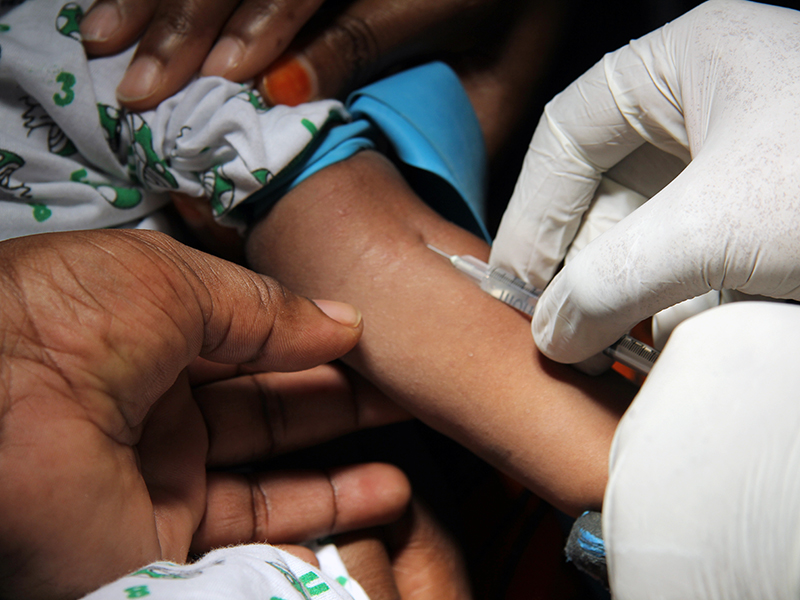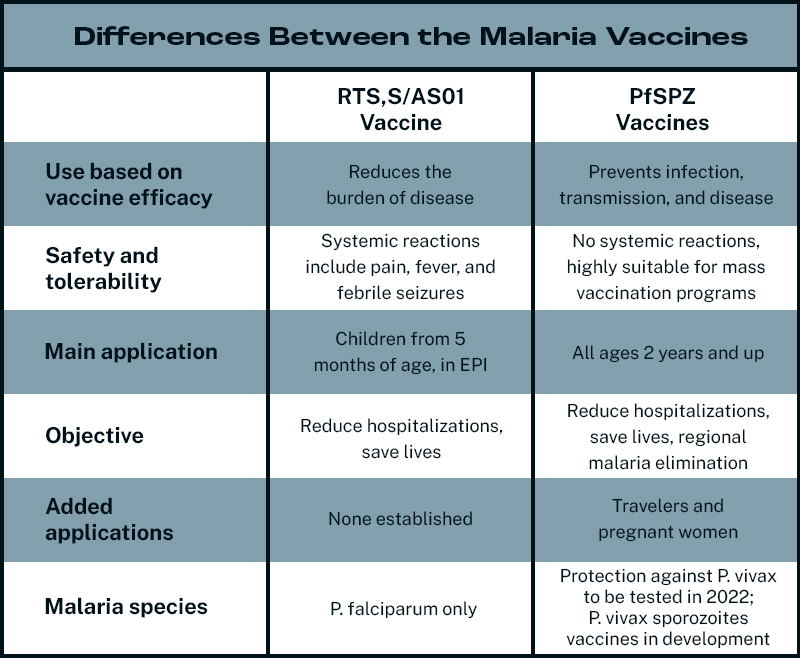Success of RTS,S/AS01 Malaria Vaccine Paves the Way for Next Generation PfSPZ Vaccine for Malaria Elimination
Oct. 25, 2021

The World Health Organization (WHO) recently endorsed the widespread use of the RTS,S/AS01 malaria vaccine for children in Sub-Saharan Africa and in other regions with moderate to high malaria transmission.
Medical Care Development (MCD) applauds this decision as clinical trials and ongoing pilot vaccination programs in Africa have indicated that, when used in combination with other malaria control measures (e.g., insecticide treated bed nets), the RTS,S/AS01 vaccine can significantly reduce the incidence of severe malaria and deaths among children caused by the Plasmodium falciparum parasite.
According to the WHO, P. falciparum malaria is one of the principle causes of childhood illness and death in Sub-Saharan Africa where more than 260,000 African children under the age of 5 die from malaria every year. The pilot vaccination programs for RTS,S/AS01 have revealed that parents are enthusiastic to have their children vaccinated against malaria while continuing to adhere to existing control measures, such as using bed nets. The success of the RTS,S/AS01 vaccine roll-out supports the feasibility of widespread malaria vaccination in Africa.
According to Dr. Pedro Alonso, director of the Global Malaria Programme at the WHO, “RTS,S/AS01 is an important first-generation malaria vaccine that can avert hundreds of thousands of cases and deaths. However, in order to realize our shared goal of a malaria-free world, we will need highly efficacious vaccines that [also] prevent infection.”
One such next generation malaria vaccine candidate that shows promise in preventing blood-stage infection are new whole parasite or sporozoite Plasmodium falciparum (PfSPZ) vaccines. These vaccines are under development by a consortium of more than 65 research institutions led by Sanaria, Inc., and has the potential to be used for more widespread distribution in mass vaccination programs aimed at eliminating malaria.
MCD’s international public health division (MCDI) is actively supporting clinical trials for the new PfSPZ vaccine through its Bioko Island Malaria Elimination Project (BIMEP) in Equatorial Guinea. The BIMEP is an award-winning, public-private partnership launched in 2004 and includes the Equatoguinean Malaria Vaccine Initiative (EGMVI) to test the safety, tolerability, and protective efficacy of PfSPZ malaria vaccines, which began in 2013.
The graphic below provides further details regarding differences between the RTS,S/AS01 vaccine and PfSPZ vaccines:

“MCD is honored to work with the U.S.-based biotech firm Sanaria Inc., the Government of Equatorial Guinea, and other partners in conducting clinical trials for the PfSPZ vaccine on Bioko Island,” said Chris Schwabe, Ph.D., CEO and president of MCD. “With the endorsement of the WHO, the RTS,S/AS01 vaccine is laying essential groundwork for the potential future widespread use of PfSPZ vaccines in mass vaccination campaigns ultimately aimed at completely eliminating malaria."
MCD supports the development of vaccines such as RTS,S/AS01 that aim to reduce childhood morbidity and mortality, and vaccines such as the PfSPZ that aim to ultimately eliminate malaria altogether. We thank our partners — National Malaria Control Programme and the Ministry of Health and Social Welfare of Equatorial Guinea, Sanaria, Ifakara Health Institute, Swiss Tropical Health Institute, Marathon Oil, Noble Energy EG Ltd (A Chevron Company), Atlantic Methanol Production Company, and the Ministry of Mines and Energy of Equatorial Guinea — for their continued support of our work toward malaria elimination.
About Medical Care Development
Medical Care Development (MCD) is a global public health nonprofit and National Public Health Institute that envisions a world in which all people have access to high-quality solutions to improve and maintain their health and well-being. MCD’s international division (MCDI) works across several health areas to provide high-quality, cost-effective, accessible, and enduring interventions to improve the health and well-being of people around the world. These areas include: malaria, HIV/AIDS and tuberculosis, Zika, reproductive, maternal, newborn, and child health, cervical cancer, water, sanitation, and hygiene, institutional strengthening, and performance-based financing.